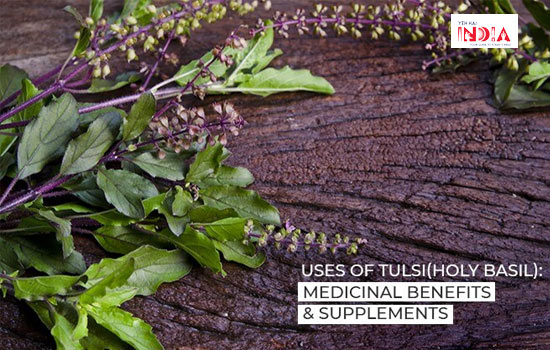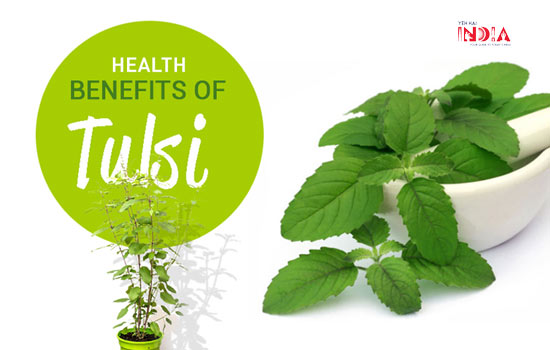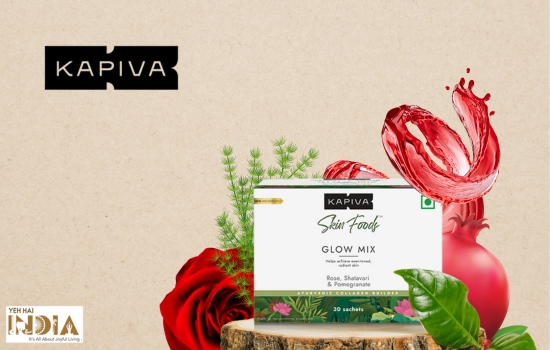Read here to know more about this sacred plant that has many medicinal uses and how to include it in your daily diet.
Tulsi, also known as holy basil, is a sacred, medicinal plant described in ancient literature.
The name Tulsi comes from Sanskrit, which means ‘matchless one.’
Tulsi has a specific aroma and this plant can be found throughout India, from Andaman and Nicobar Islands to the Himalayas. Scientifically called Ocimum sanctum, Tulsi has two varieties: black (Krishna Tulsi) and green (Rama Tulsi), but their chemical constituents are similar.
The Indian mythological book Padmottara Purana tells that if a house has a garden of Tulsi then that house is a center of pilgrimage; neither the servants of Yama nor disease can enter. Wherever the fragrance of Tulsi goes, the air is purified. This statement is on par with the fact that essential oils present in Tulsi that form a specific, potent fragrance can destroy many microbes in the air.
Recommended Story – Diabetes: Healthy Food Choices as prescribed by Ayurveda
Every part of the plant has useful applications in Ayurveda, Siddha, and also in Greek, Roman, and Unani system of medicines.
In Ayurveda, Tulsi is revered as the ‘elixir of life’ for both its medicinal and spiritual properties. Consuming tulsi daily is said to promote general health, longevity, and well-being.
Health Benefits of Tulsi

1. Protects against toxins: chemicals, heavy metals, and radiation
The physiological benefits of Tulsi can be attributed to its ability to be the body’s internal housekeeper and protect it against chemicals and heavy metals. Tulsi has a high content of phenolic compounds and antioxidants. They clear up free radicals in the body that are a result of ingested toxins and heavy metals like lead, arsenic, cadmium, and mercury.
2. Relieves physical, mental, and metabolic stress
Taking tulsi regularly in small doses helps against prolonged physical activities, poor diet, and mental stress. Studies have shown that tulsi increases metabolism and helps improve swimming time in lab animals. This herb also reduces anxiety and depression and is comparable to antidepressant drugs. It also improves memory and brain function.
Ayurvedic physicians recommend drinking tulsi tea every day as an essential lifestyle practice.
3. Fights infections and strengthens immunity
According to research, tulsi is anti-bacterial, anti-viral, and anti-fungal. Thus, it fights infections and protects the body. Tulsi also helps boost immunity because of its antioxidant properties. As per Ayurveda, Tulsi is efficient against lung problems like cough, bronchitis, and asthma.
4. Blood Purifier
Tulsi is an excellent blood purifier as it flushes out the toxins in the blood and normalizes blood pressure. Chewing fresh tulsi leaves every day is very helpful for the body.
5. Improves Oral health
Another benefit of chewing tulsi leaves is that it improves oral health. Several studies have tested tulsi’s effects on the oral cavity of patients. Rinsing the mouth for 3 weeks with tulsi extracts reduced plaque and gum inflammation.
6. Good for skin diseases
Tulsi has been used in Ayurveda for treating many skin disorders. It is used on rashes, insect bites, and itching. Tulsi extracts also help reduce acne and acne scars. Its anti-inflammatory properties make it a great balm for reducing swelling and pain.
7. Fights Cancer
Tulsi’s myriad compounds also help fight cancer cells. Various studies have found tulsi leaf extracts to be useful against the skin, oral, and blood cancer.
Apart from these, Tulsi is also used for earaches, arthritis, diarrhea, dysentery, back pain, snake bites, and to repel mosquitoes.
Recommended Story – Ayurveda-An Overview
Ways to include Tulsi in your diet

Traditionally, tulsi can be consumed in many forms: fresh leaves, dried powder, herbal tea, or mixed with other superfoods such as honey and ginger.
- Ayurvedic physicians recommend using all parts of Tulsi. You can collect the leaves, tender branches and roots, seeds, and flowers of the plant; wash them thoroughly; cut them into small pieces, and crush them in a mortar and pestle to form a paste. This paste can be mixed with honey and ginger and eaten daily for improving overall health.
- You can also extract the liquid from the paste by using a thin cotton cloth and squeezing out the liquid. This tulsi extract can be taken daily for ailments like cold, cough, headaches, stomach disorders, poisoning, and malaria.
- The leaves, tender stems, and seeds of the plant can be dried and crushed to make tea powder.
Tulsi has varied uses in Ayurveda as well as other systems of medicine. It rightly deserves the title ‘incomparable one.’
The juice from tulsi’s fresh leaves is given to patients to treat chronic fever, dysentery, hemorrhage, and dyspepsia.
Tulsi extract along with Triphala is used in Ayurvedic eye drop preparations recommended for glaucoma, cataract, chronic conjunctivitis, and other painful eye diseases.
These collective effects cannot be fully duplicated by isolating the compounds present in Tulsi. Because of its inherent biochemical complexity, Tulsi has eluded modern science but stands as a testament to the wisdom of Ayurveda.
Also Read – Ayurveda and Its Rising Popularity Around the World










